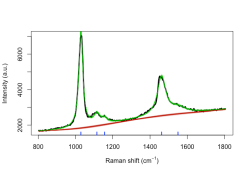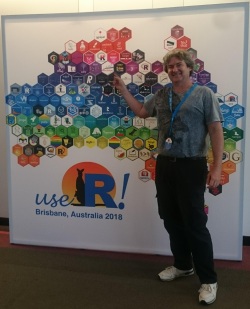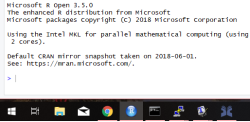
Rob Salamone gave a highly entertaining introduction to a wide variety of exciting new MCMC methods at the SSA NSW branch meeting this week. His slides are available online.
The One World Approximate Bayesian Computation (ABC) seminar series is held fortnightly. Tonight’s talk is by Marko Järvenpää on the topic of “Batch simulations and uncertainty quantification in Gaussian process surrogate ABC.” After that, David Frazier will be giving a talk on October 15.
The Bayesian Nonparametric (BNP) section of ISBA has launched a new monthly webinar series. The next talk is by Yanxun Xu on the topic “A Bayesian Nonparametric Approach for Inferring Drug Combination Effects on Mental Health in People with HIV” and will be held on October 7.
Gael Martin will be presenting a talk in the SSA Webinar Series on November 11 on the topic of “Computing Bayes: Bayesian Computation from 1763 to the 21st Century.” More details are available here.

Sadly, the R package hyperSpec has been archived from CRAN on January 31st “as check problems were not corrected in time.” The package maintainers did release a new version on January 17, so I don’t know what went wrong. The package is still included in Bryan Hanson’s list of open-source software for spectroscopy, but not on the CRAN Task View for Chemometrics and Computational Physics.
The main reason that I use hyperSpec is for reading spectra in a variety of proprietary file formats, such as Thermo Galactic/Grams .spc files, as well as Perkin Elmer, Horiba, Cytospec, Shimadzu and other spectrometer manufacturers. This was a major reason why I originally chose R over alternatives like Python or MATLAB for working with spectroscopy datasets. The package is outstanding quality, very easy to use, with excellent documentation.
I’d like to thank the package authors, Claudia Beleites and Valter Sergo, as well as all of the contributors: Alois Bonifacio, Marcel Dahms, Björn Egert, Simon Fuller, Vilmantas Gegzna, Rustam Guliev, Michael Hermes, Martin Kammer, Roman Kiselev, Sebastian Mellor, and of course Bryan Hanson. After all of the hours they’ve put into this software, I can appreciate how frustrating this must be. hyperSpec has certainly saved me many hours of work with its convenient functions for importing and plotting data.
I had a similar situation a while back with my other R package bayesImageS, where a package that I depended on was suddenly yoinked from CRAN. For some reason, this always seems to happen around Christmas and New Year’s Eve, when most package maintainers are unlikely to be checking their work email and hence least able to respond on short notice.
In any case, I have now removed hyperSpec from the list of suggested packages, even though I am unable to suggest a suitable replacement! I’ve installed version 0.99-20200115 from the CRAN archive and it is working fine. I’ve also updated the vignettes accordingly. A new version 0.4-1 of serrsBayes is now available on CRAN. Release notes are available here.
The New Yorker cartoon is by Edward Steed, with caption by whyDoesR?
Inspired by many similar lists, for example this one by Carl Anderson and this one by Yu Wu, below is a list of free, online resources for learning data science (i.e. programming, machine learning, and statistics). This list includes textbooks (published online or with a free PDF) as well as YouTube videos and online courses (MOOCs). As always with these things, your mileage may vary.

I’ll be giving a talk at ANU on Tuesday, for the Canberra branch of the Statistical Society of Australia: “Statistics from Mars – Bayesian signal processing for Raman Spectroscopy.” I’ll also be presenting a talk at the 12th International Conference on Monte Carlo Methods and Applications (MCM 2019) at UTS. I’ve volunteered as the newsletter editor for the Bayes Section of SSA. Our June newsletter is now available online.

I’ve just released a new version of my R package serrsBayes. It includes a fix for a major bug, where I was using the upper-triangular instead of the lower-triangular Cholesky factor for random-walk Metropolis proposals. It also includes a reimplementation of fitVoigtPeaksSMC using RcppEigen with OpenMP for parallelism. This function is still slower than fitSpectraSMC, but should result in a big speed improvement if you have OpenMP multi-threading enabled. See the release notes and CRANberries for details.

A couple of seminars that I wanted to highlight in the next couple of weeks: one from A/Prof Mirko Draca (Department of Economics, University of Warwick) and another from me. Mirko will be speaking in the NIASRA Seminar Series this week at Wollongong, while I’ll be flying home to Brisbane next week to present a talk at the ACEMS Workshop on Intractable Likelihoods & ABC. Abstracts for both talks are below:

I was very lucky to be invited to attend a 5 day workshop at the Casa Matemática Oaxaca (CMO-BIRS), “Computational Statistics and Molecular Simulation: A Practical Cross-Fertilization” where I presented my work on the Rao-Blackwellized particle filter for Bayesian modelling of Raman spectroscopy. A link to the video is here and the abstract for my talk is below. See also commentary on selected talks by one of the organisers, Prof. Xi’an.

I’ve just arXiv’d another revision of my paper on the PFAB algorithm: arXiv:1503.08066v3 [stat.CO]. It includes a rather elegant proof of the exact mean and variance of the sufficient statistic S(y) in the hottest state, when the inverse temperature . The proof by my co-author Geoff Nicholls holds for any Potts model with first-order neighbours. That is, the nearest 4 neighbours in a 2D lattice (or 6 neighbours in 3D). For posterity, I present my rather clunkier proof below, which involves induction on dimension for a rectangular lattice.

It was great to be back in Brissie for the first time since my PhD graduation, 3 years ago. The R Consortium have made video of all of the talks available on YouTube – a link to mine is below, along with my slides.

As usual when I set up a new computer, I like to update the list of software that I have installed. This is particularly pertinent when I’m about to move back to Australia and will have to say goodbye to my beloved MacBook Air. Note that I won’t be running R using the Windows Subsystem for Linux, although this is definitely something I’m keen to experiment with at some point. Instead, I’ll be using MRO, since it includes the Intel Math Kernel Library (MKL) for Windows. This is important if you run R packages (including RcppArmadillo) that make heavy use of linear algebra.